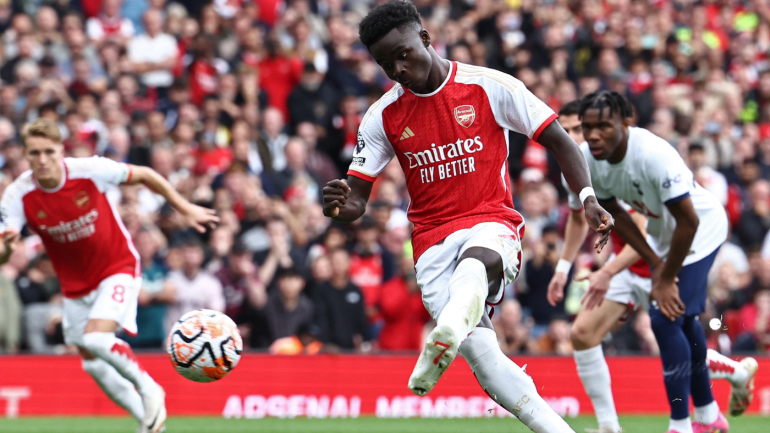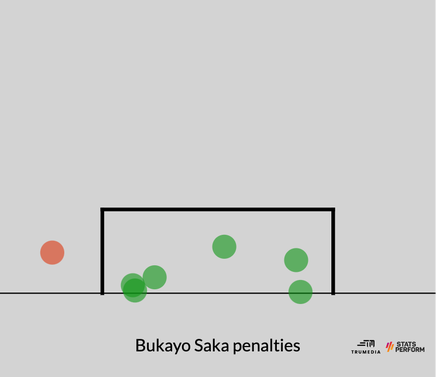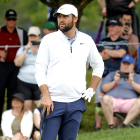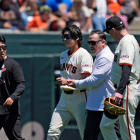
It was when Arsenal travelled to Chelsea in the 2021-22 season that Bukayo Saka was afforded a chance to set a new narrative from 12 yards out. Nine months on from the penalty he missed during England's shootout loss to Italy in the Euro 2020 final and the vile torrent of abuse that followed, Saka took hold of the ball and stepped away from the tumult. For an instant Gabriel Martinelli gestures towards his team mate but it soon becomes apparent that it will be Saka from the spot.
Stamford Bridge bristles with shock. Saka had not taken a competitive penalty for Arsenal before. This is a high pressure moment, an added time chance to kill off a game Arsenal lead 3-2 that his side probably needed to win if they were to revive their hopes of a top four finish. No one expected Saka to thrust himself into such a high stakes moment, perhaps Mikel Arteta least of all. "I thought that Gabi [Martinelli] was going to take it," the Arsenal manager said. Saka calmly tucked it home to ice the game and Arsenal walked off 4-2 winners.

Golazo Starting XI Newsletter
Get your Soccer Fix from Around the Globe
Your ultimate guide to the Beautiful Game as our experts take you beyond the pitch and around the globe with news that matters.
Thanks for signing up!
Keep an eye on your inbox.
Sorry!
There was an error processing your subscription.
Eleven penalties later, Arteta's players continue to surprise him. Five different players have taken those spot kicks and while Saka takes more than most, the hierarchy seems all the more muddled of late. Arsenal have had an almighty number of penalties awarded to them this season, five of the 23 handed out in all Premier League games, something of a statistical curio that likely can't last, even for a team that have so many pacy forwards running into the penalty area.
What seems more likely to be consistent going forward is the inconsistency of their takers. Saka has taken two, the same number as Martin Odegaard, while Kai Havertz was afforded the chance to open his account in the 4-0 win over Bournemouth last month. Go further back to the penalties since that night at Stamford Bridge and there is further flux. Gabriels Jesus and Martinelli both have one to their name too.
Such variety is not the case at Arsenal's contemporaries. Liverpool have had 21 penalties in the Premier League since the start of the 2020-21 season. Mohamed Salah has taken 19 of them. The other two, dispatched by Fabinho, were when the Egyptian was off the pitch. Since Erling Haaland arrived in England he has taken nine in the top flight and given up two, one when Ilkay Gundogan was on a hat trick (in classic Manchester City fashion he smacked his effort onto the post). Before he left, the last time Harry Kane didn't take a penalty for Tottenham he was trying to maneuver his way to the Etihad.
In many ways the spot kick is the ultimate expression of a team's pecking order. Who hits the ball truest? Who best reads the man stood across from them? More even than that, who do you trust most when the stakes are highest? The answer at Arsenal, it would appear, is whoever is feeling it most.
Don't miss CBS Sports Golazo Network's Morning Footy, now in podcast form! Our crew brings you all the news, views, highlights and laughs you need to follow the Beautiful Game in every corner of the globe, every Monday-Friday all year long.
There is an established hierarchy, at least according to Arteta, but when the Arsenal manager sets out how that works in practice, the vibe becomes a little more collegiate. "They have surprised me already this season," he told CBS Sports in his pre-match press conference ahead of Saturday's trip to Stamford Bridge. "I don't really know who is going to take it, sometimes when I see [there's a penalty] and someone has the ball, I'm still doubting."
In recent years, with every penalty awarded the subject of a VAR review that is not completed until tedium has long since set in, opponents have taken it on themselves to use that time to psyche out their opposition. Former Arsenal goalkeeper Emi Martinez, for example, often acting like a man who believes he has already saved the penalty before the taker has put the ball down, is a master of this dark art for both Aston Villa and Argentina. Arteta's players are not alone in running something akin to counter psy-ops but they do it very well. Midway through last season it became apparent that there were no guarantees that the man with the ball in his hand would be stepping back from it when the time came to shoot the shot. Jesus looked for all the world like he was the man at the London Stadium in April, instead it was Saka who struck the effort (notably the only one of Arsenal's last 12 league penalties that did not result in a goal).
Everything seems designed to give the opposition as little information as possible to go off. It has become common place ahead of penalties to see goalkeepers checking their water bottlers, where they have the tendencies of an opposing penalty taker hidden away for them to consult. Robert Sanchez would need a big gulp cup on Saturday just to fit on the placement maps of all the possible Arsenal takers. How would the Chelsea goalkeeper make an educated guess in the same way he might for Lionel Messi -- who tends to hit a lot of his recent spot kicks into the bottom right hand corner -- when there is a sample size of half a dozen for even the most frequent of opponents?
And then, even on an individual level, what is anyone supposed to do with Saka's penalty chart but pick a direction and hope?

For now, at least, variety is spicing things up for Arsenal. There perhaps isn't enough of a sample size in 12 penalties to say that their ad hoc approach is working but considering 11 have been scored -- based on their xG value you would expect nine or 10 to go in -- it certainly isn't hurting the Gunners' goal output. Meanwhile, there is value to be gained for spreading the scoring, as Arteta hinted. A coach who spends so much of his time manically tinkering from the touchline seems perfectly prepared to go on trust and good energy when his team are handed one of the most high value opportunities in the sport.
"It's a very particular moment, very related to game state and what you've been doing, how you feel emotionally and confidence wise," he said. "I don't like to get too involved. There is some preparation obviously and certain players that if they are in contention to take that penalty, the practice has to be there. That's the only thing I demand them to do. After that, it's their decision."
That decision need not be about who is the best finisher. Certainly there is an argument that when the game provides you with a 79 percent chance of a goal you do not ask an out of form Havertz to observe the dental qualities of this particular gift horse. Then again, could there be a better opportunity to give any player the fillip of a first goal for the club or a chance to brush away painful memories?
The penalty kick is one of the most high value moments in the sport. Too often it is looked on only as a burden, a moment of pressure where success is the baseline, and the only surprise can be failure. But Arsenal approach it differently. This team seems to see it as a rare opportunity, one which can be deploy a positive spark to the club, and shine some good fortune where it might ne needed most. By seeing the chance to take penalties as a positive, and by sharing the boon across the squad, Arsenal seem to be getting more from it than most.





















